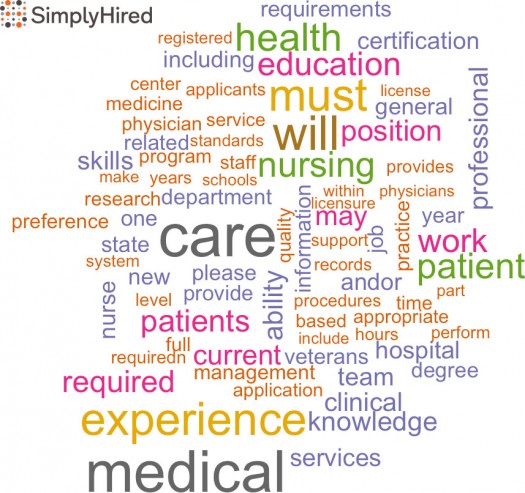Every day, millions of job seekers enter millions of search terms into job search engines. On an average session, a job seeker might view hundreds of job listings and click through to dozens of job descriptions.
The search terms and location are the most obvious indicators of which jobs will be shown to a job seeker when they use a search engine. Given this obvious connection between a job seeker’s search and the job listing delivered, you might find it surprising how often employer job descriptions do not contain the words that job seekers are using in their search.
Lessons From the Cloud
Below is a word cloud of job seeker search terms in the healthcare category, with words sized by frequency of use. You’ll notice that job seeker search terms are focused on two things: role and specialty. Role-based terms such as “nurse” and supporting terms like “practitioner,” “registered,” and “assistant” are the most popular, followed by other medical roles like “pharmacist,” “technologist,” and “therapist.” Words related to medical specialty like “radiology,” “dental,” “psychiatric,” “respiratory,” and “ultrasound,” are lower in volume, but suggest the wide range of medical jobs.

In contrast, the word cloud for the employer’s job titles and job descriptions in the healthcare category shows that the most popular words are general healthcare terms, such as “care,” “health, “patient,” “medical,” and “experience.” The more specific words relate to duties, position requirements, and responsibilities, such as “procedures,” “management,” “hospital, and “research.”

This data tells us that job seekers are very focused in their searches. They likely know what role they are looking for and what specialty, if any. In the age of online search, writing job descriptions is about more than accurately representing a position’s responsibilities and requirements. It’s about being found.
Because the results delivered by job search engines are based on job seeker search terms filtered through the search engine’s algorithms, personalization features, and relevancy rankings, it’s of utmost importance that employers craft job titles and descriptions that match both how users search and how the search engines scan descriptions. A well-crafted job listing can determine whether or not your job is matched to a qualified candidate, and can mean the difference between a qualified candidate applying for your job or another company’s job.